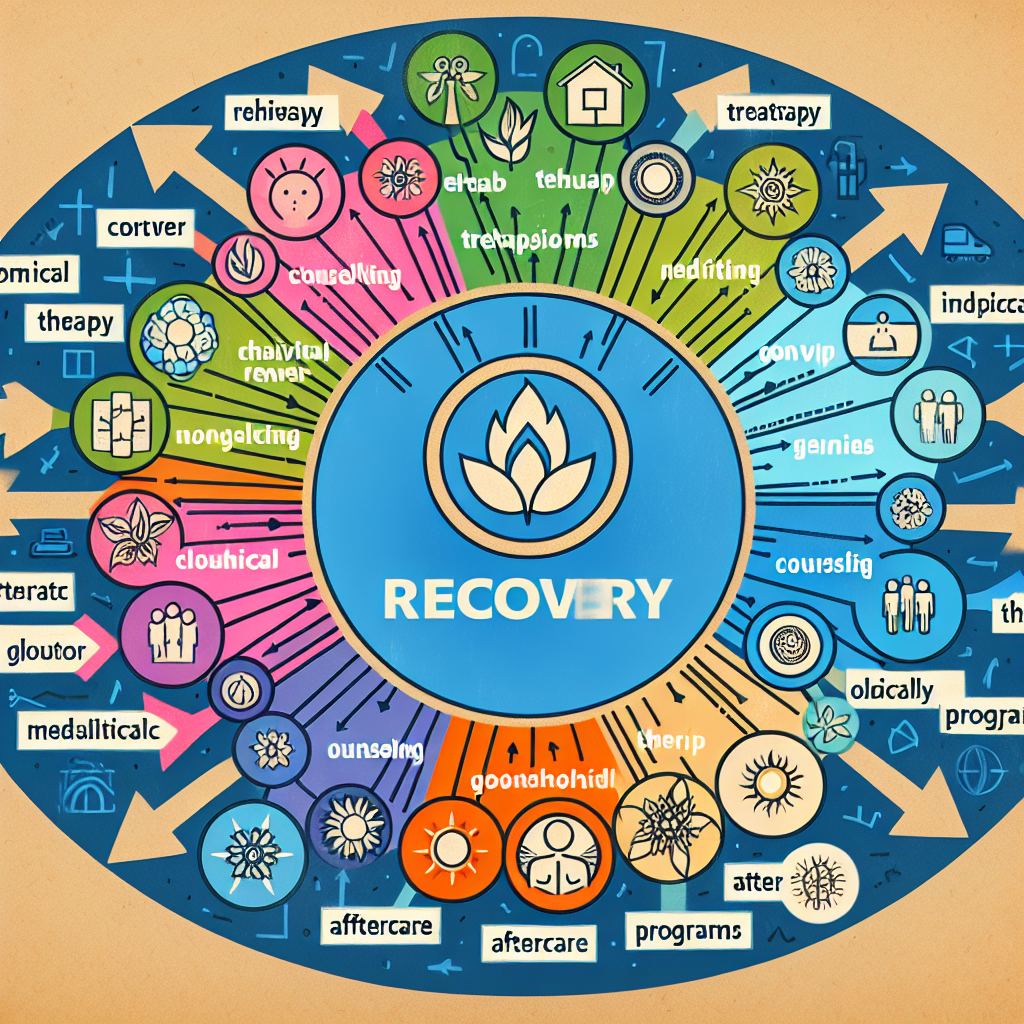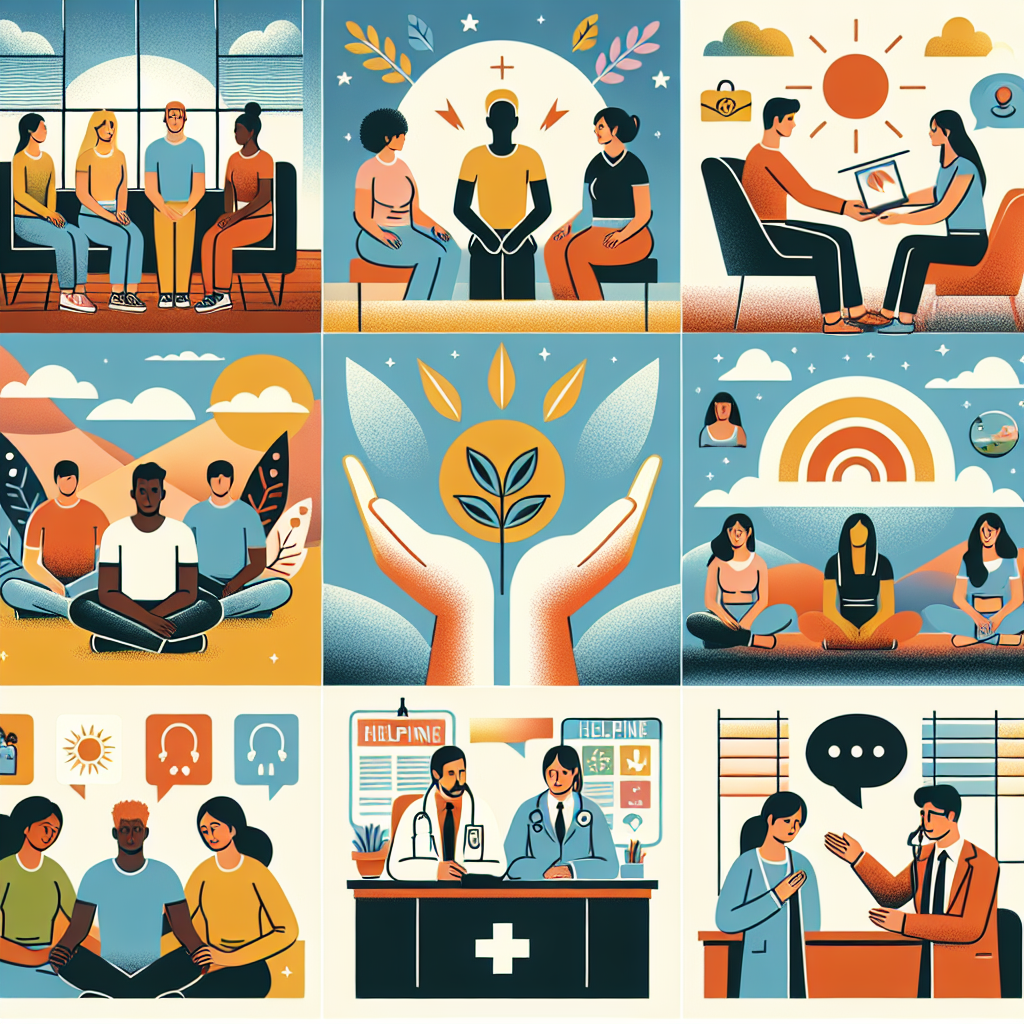-
Table of Contents

“Comprehensive Care for Every Step: Detox, Counseling, Therapy, and Support Groups.”
Introduction
Addiction recovery services encompass a wide range of programs and interventions designed to help individuals overcome substance use disorders and achieve long-term sobriety. These services include inpatient and outpatient treatment programs, detoxification services, counseling and therapy, medication-assisted treatment, support groups, and aftercare planning. Inpatient treatment provides a structured environment with 24-hour care, while outpatient programs offer flexibility for those who need to maintain daily responsibilities. Detoxification services help manage withdrawal symptoms, and counseling and therapy address the psychological aspects of addiction. Medication-assisted treatment combines medications with behavioral therapies to reduce cravings and withdrawal symptoms. Support groups, such as Alcoholics Anonymous (AA) and Narcotics Anonymous (NA), offer peer support and shared experiences. Aftercare planning ensures ongoing support and resources to prevent relapse and maintain recovery.
Comprehensive Guide to Inpatient and Outpatient Addiction Recovery Services
Addiction recovery is a journey that requires a multifaceted approach, tailored to the unique needs of each individual. Understanding the various types of addiction recovery services available can empower those seeking help to make informed decisions about their path to sobriety. Both inpatient and outpatient services offer distinct advantages, and knowing the differences can be crucial in choosing the right program.
Inpatient addiction recovery services, often referred to as residential treatment, provide a structured environment where individuals can focus entirely on their recovery. These programs typically involve a stay at a treatment facility, ranging from a few weeks to several months. The immersive nature of inpatient care allows for intensive therapy, medical supervision, and a break from the triggers and stressors of daily life. This setting can be particularly beneficial for those with severe addictions or co-occurring mental health disorders, as it offers a safe and supportive space to begin the healing process. Moreover, the sense of community and shared experience among residents can foster a strong support network, which is invaluable during the early stages of recovery.
Transitioning to outpatient addiction recovery services, these programs offer greater flexibility, allowing individuals to maintain their daily responsibilities while receiving treatment. Outpatient services vary in intensity, from standard outpatient programs to more rigorous partial hospitalization programs (PHPs) and intensive outpatient programs (IOPs). Standard outpatient programs typically involve weekly therapy sessions and support groups, providing ongoing care and accountability. PHPs and IOPs, on the other hand, offer more frequent and structured treatment, often including multiple therapy sessions per week, medical monitoring, and educational workshops. This level of care can be ideal for those who need substantial support but cannot commit to a residential program due to work, family, or other obligations.
Both inpatient and outpatient services often incorporate a range of therapeutic modalities to address the complex nature of addiction. Cognitive-behavioral therapy (CBT) is a common approach, helping individuals identify and change negative thought patterns and behaviors. Motivational interviewing (MI) is another effective technique, focusing on enhancing an individual’s motivation to change. Additionally, many programs offer holistic therapies such as yoga, meditation, and art therapy, which can complement traditional treatments by promoting overall well-being and stress reduction.
Medication-assisted treatment (MAT) is another critical component of many addiction recovery services. MAT combines behavioral therapy with medications that can help manage withdrawal symptoms and reduce cravings. This approach is particularly effective for opioid and alcohol addictions, where medications like methadone, buprenorphine, and naltrexone can play a vital role in maintaining sobriety. By addressing the physical aspects of addiction, MAT can provide a more comprehensive treatment plan.
Support groups, such as Alcoholics Anonymous (AA) and Narcotics Anonymous (NA), are also integral to many recovery journeys. These peer-led groups offer a sense of community and shared experience, providing ongoing support and accountability. Many inpatient and outpatient programs encourage participation in these groups as a way to build a robust support network that extends beyond formal treatment.
Ultimately, the choice between inpatient and outpatient addiction recovery services depends on various factors, including the severity of the addiction, the presence of co-occurring disorders, and personal circumstances. Both types of services offer valuable tools and support, and many individuals find success by transitioning from inpatient to outpatient care as they progress in their recovery. By exploring the available options and seeking professional guidance, individuals can embark on a path to recovery that is both effective and sustainable.
Exploring Holistic and Traditional Approaches in Addiction Recovery Services
Addiction recovery is a multifaceted journey that requires a comprehensive approach to address the physical, emotional, and psychological aspects of dependency. As individuals seek to reclaim their lives from the grip of addiction, they are often presented with a variety of recovery services that cater to different needs and preferences. Exploring both holistic and traditional approaches can provide a clearer understanding of the options available and inspire hope for those embarking on the path to recovery.
Traditional addiction recovery services have long been the cornerstone of treatment for substance use disorders. These services typically include medical detoxification, inpatient rehabilitation, outpatient programs, and counseling. Medical detoxification is often the first step, where individuals undergo supervised withdrawal from substances in a safe and controlled environment. This process is crucial for managing withdrawal symptoms and preventing potential complications.
Following detoxification, inpatient rehabilitation programs offer a structured environment where individuals can focus entirely on their recovery. These programs usually involve a combination of individual therapy, group therapy, and educational sessions designed to equip individuals with the tools they need to maintain sobriety. Outpatient programs, on the other hand, provide similar therapeutic services but allow individuals to live at home and continue with their daily responsibilities while receiving treatment.
Counseling, whether individual or group, plays a pivotal role in traditional addiction recovery services. Cognitive-behavioral therapy (CBT), motivational interviewing, and family therapy are some of the evidence-based approaches used to help individuals understand the root causes of their addiction, develop coping strategies, and rebuild relationships. These therapies aim to address the psychological aspects of addiction, fostering long-term recovery and personal growth.
In addition to traditional methods, holistic approaches to addiction recovery have gained popularity for their emphasis on treating the whole person rather than just the addiction. Holistic recovery services incorporate a variety of practices that promote physical, emotional, and spiritual well-being. These may include yoga, meditation, acupuncture, and nutritional counseling. By integrating these practices into their recovery plan, individuals can achieve a greater sense of balance and inner peace.
Yoga and meditation, for instance, are powerful tools for managing stress and enhancing mindfulness. These practices encourage individuals to connect with their inner selves, fostering self-awareness and emotional regulation. Acupuncture, an ancient Chinese practice, is believed to help reduce cravings and alleviate withdrawal symptoms by stimulating specific points on the body. Nutritional counseling, meanwhile, addresses the often-overlooked aspect of physical health, ensuring that individuals receive the nutrients they need to support their recovery.
Moreover, holistic approaches often extend to creative therapies such as art therapy, music therapy, and equine therapy. These therapies provide alternative outlets for expression and healing, allowing individuals to explore their emotions and experiences in a non-verbal manner. Art therapy, for example, can help individuals process trauma and express feelings that may be difficult to articulate. Music therapy uses the power of rhythm and melody to promote relaxation and emotional release, while equine therapy involves interactions with horses to build trust, empathy, and self-confidence.
Ultimately, the journey to recovery is deeply personal, and what works for one individual may not work for another. By offering a diverse array of services, both traditional and holistic, addiction recovery programs can cater to the unique needs of each person. This comprehensive approach not only addresses the multifaceted nature of addiction but also empowers individuals to take control of their recovery and build a fulfilling, substance-free life. As more people explore these varied paths to healing, the hope for recovery becomes a tangible reality, inspiring others to embark on their own journeys toward wellness.
Q&A
1. **Question:** What are some common types of addiction recovery services available?
**Answer:** Common types of addiction recovery services include inpatient rehabilitation, outpatient rehabilitation, detoxification programs, counseling and therapy, support groups (such as Alcoholics Anonymous or Narcotics Anonymous), medication-assisted treatment, and sober living homes.
2. **Question:** What role do support groups play in addiction recovery?
**Answer:** Support groups provide a community of individuals who share similar experiences with addiction, offering emotional support, accountability, and practical advice to help members maintain sobriety and navigate the challenges of recovery.
Conclusion
Addiction recovery services encompass a variety of approaches, including inpatient and outpatient rehabilitation programs, detoxification services, counseling and therapy (individual, group, and family), medication-assisted treatment (MAT), support groups such as Alcoholics Anonymous (AA) and Narcotics Anonymous (NA), sober living homes, and holistic therapies like yoga and meditation. These services aim to address the physical, psychological, and social aspects of addiction, providing comprehensive support for individuals seeking to achieve and maintain sobriety.



